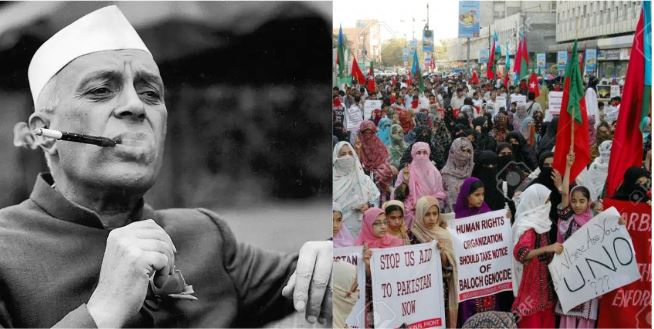It is common knowledge that the first 15 years of independent India were a geopolitical catastrophe when New Delhi’s interests got compromised in all strategic areas because the man at the top, Jawaharlal Nehru wanted to secure his image as the ultimate peace-maker.
Remembered amongst some of his biggest blunders are the Himalayan blunder of 1962 and the Kashmir blunder of 1947-48 when Pakistan was allowed to occupy a part of Kashmir even though Pakistani troops had been beaten black and blue. But many fail to understand that the biggest of his blunders was the Balochistan blunder.
Nehru failed to realise the strategic importance of Balochistan province and turned down an offer by the “King” or Khan of Kalat, Mir Ahmadyar Khan to accede to India. Today, Pakistan is occupying the Balochistan province, which forms 40 per cent of Pakistan administered territory and China is using the Gwadar port for building presence and influence in the Indian Ocean Region (IOR).
According to London-based think-tank, The Foreign Policy Center, FPC, concurs that the Balochs were let down not only by the British but also by the top Indian political leadership of the time.
The then Baloch sovereign Khan of Kalat was fond of listening to All India Radio (AIR). He was in for a shock on March 27, 1948 when he heard a broadcast of VP Menon, the secretary in the Ministry of States. The press conference by Menon said, “Menon revealed that the Khan of Kalat was pressing India to accept Kalat’s accession, but added that India would have nothing to do with it.”
The next day Sardar Patel contradicted the Secretary but damage was done. Nehru himself went to great lengths on March 30, 1948 to deny what Menon had said and the Khan of Kalat too denied what had been broadcast.
But Pakistani military boots had already landed in Balochistan on the pretext that he was colluding with Pakistan’s adversary.
According to Human rights activist Waseem Altaf, “On orders emanating from Mr Jinnah, Balochistan was forcibly annexed to Pakistan on 28th March 1948 when on 27th March 1948, Lt Colonel Gulzar of the 7th Baluch Regiment under GOC Major General Mohammad Akbar Khan invaded the Khanate of Kalat. General Akbar escorted the Khan of Kalat to Karachi and forced him to sign on the instrument of accession while Pakistan Navy’s destroyers reached Pasni and Jiwani.”
India’s political leadership turned a blind eye towards Balochistan, but Pakistan was working overtime to annex Balochistan. On March 22, 1948 Pakistan Prime Minister Liaquat Ali Khan presided over a meeting of the three services Chief with an eye on annexation of Balochistan.
Nehru probably believed that a strong Pakistan would have meant peace in the region, but he clearly suffered from strategic myopia and lack of geopolitical awareness.
Neither could he realise the true value of the strategic significance of the Balochistan province and its proximity to the Indian Ocean Region (IOR) nor could he anticipate a China-Pakistan axis which would be antagonistic to India’s interests in the IOR.
Nehru thought of himself as a diplomat, but he had an extremely wrong perception of both diplomacy and peace. A diplomat is soft-spoken, but has a strong vision and geo-strategic awareness. The ultimate end of deft diplomacy is to safeguard and advance, national and strategic interests.
For an idealist Nehru, however, diplomacy meant foregoing more and more of India’s strategic interests and gains.
Probably, Nehru’s idealism is what let Dr. Ambedkar to say that the foreign policy of the country has given him “cause, not merely for dissatisfaction but for actual anxiety and even worry”.
He wondered, “How dangerous it has been to us this policy of doing the impossible and of being too good”.
There can be no two views about the fact that New Delhi wants peace in its neighbourhood and vicinity. But peace doesn’t mean weakness. For Nehru, peace was the end and weakness was the means to achieve it.
He allowed Pakistan to punch above its weight by annexing Balochistan. On the Northern and Eastern front, he forgo the UNSC Permanent Seat to China and also helped Beijing project itself as the real Asian giant. Such policies made India a pale shadow of the Dragon, at least for the time being.
The result of Nehru’s weak policies was that China occupied Aksai Chin in Ladakh, while Nehru wondered why everyone is worried. He even thought that “not a blade of grass grows” in the mountains of Aksai Chin.
What Nehru did not realise that though not a blade of grass grows there but it allowed China to access Gilgit-Baltistan, PoK and Pakistan proper.
Today, China has built the China Pakistan Economic Corridor (CPEC), a part of BRI that reaches right upto Gwadar port in Balochistan and becomes a part of Beijing’s strategy to encircle India through a “string of pearls”.
Make no mistake, Nehru made several strategic blunders but the biggest of them has to be the Balochistan blunder.
